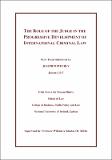| dc.contributor.advisor | Schabas, William | |
| dc.contributor.author | Powderly, Joseph | |
| dc.date.accessioned | 2017-03-31T08:05:15Z | |
| dc.date.issued | 2017-01-19 | |
| dc.identifier.uri | http://hdl.handle.net/10379/6413 | |
| dc.description.abstract | International criminal law offers fertile ground for considering the role of the bench in the development of law through creative or progressive interpretative methodologies. Since its genesis at Nuremberg more than 70 years ago, international criminal law has gone through a gradual process of evolution, maturation and codification culminating in the adoption of the Rome Statute establishing the permanent International Criminal Court in 1998. States have of course played a key role in this process; however, it is simply impossible to ignore the fact that international criminal law would not be the sophisticated body of norms it is today without the creative, developmental impetus of the judges tasked with breathing life into its often overwhelmingly laconic provisions. This thesis exploits this fertile ground and explores the role the international criminal bench has played in the development of contemporary international criminal law. The core research question asks, how is the judicial role in the development of international criminal law best understood on both a practical and a theoretical level? While the judicial role in the development of international criminal law is an unavoidable fact, international criminal legal scholarship lacks a coherent conception of the judicial function. This thesis examines the role of the international criminal judge, both in the abstract and in reality, and sets out the case for the proposition that it is a necessary component of the international criminal judicial function to ensure the progressive development of the law by means of creative judicial interpretation, subject to the limitations of the interpretative frameworks of individual institutions and the principle of legality. | en_IE |
| dc.rights | Attribution-NonCommercial-NoDerivs 3.0 Ireland | |
| dc.rights.uri | https://creativecommons.org/licenses/by-nc-nd/3.0/ie/ | |
| dc.subject | International criminal law | en_IE |
| dc.subject | International law | en_IE |
| dc.subject | Legal theory | en_IE |
| dc.subject | Judicial creativity | en_IE |
| dc.subject | Judicial interpretation | en_IE |
| dc.subject | International judicial function | en_IE |
| dc.subject | International criminal judicial function | en_IE |
| dc.subject | Judicial independence and impartiality | en_IE |
| dc.subject | Human rights | en_IE |
| dc.subject | Law | en_IE |
| dc.title | The role of the judge in the progressive development of international criminal law | en_IE |
| dc.type | Thesis | en_IE |
| dc.contributor.funder | Irish Research Council for the Humanities and Social Sciences | en_IE |
| dc.local.note | This thesis examines the role of the international criminal judiciary in the development of core aspects of international criminal law. It offers a particularised conception of the judicial function with a focus on the profile of the international criminal bench, the ethical standards that apply to the judicial function, and the position of interpretative creativity within it. | en_IE |
| dc.description.embargo | 2020-03-27 | |
| dc.local.final | Yes | en_IE |
| nui.item.downloads | 595 | |


